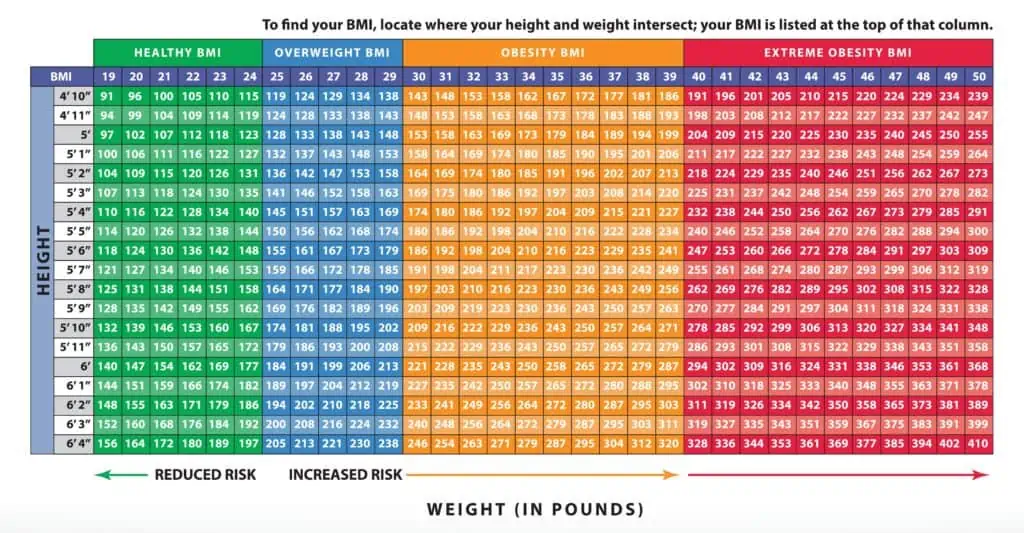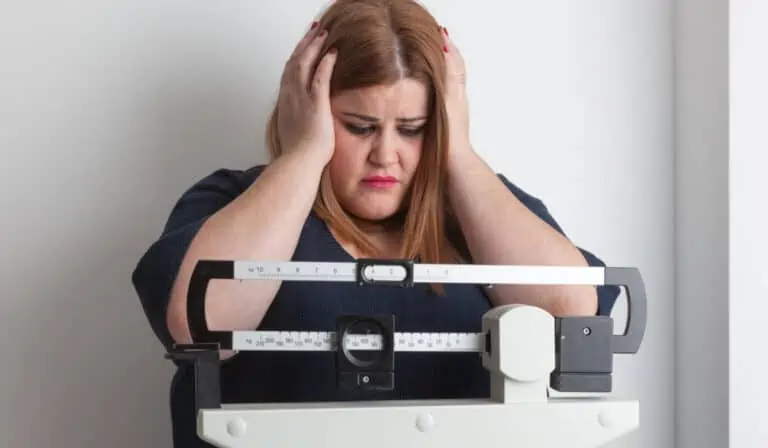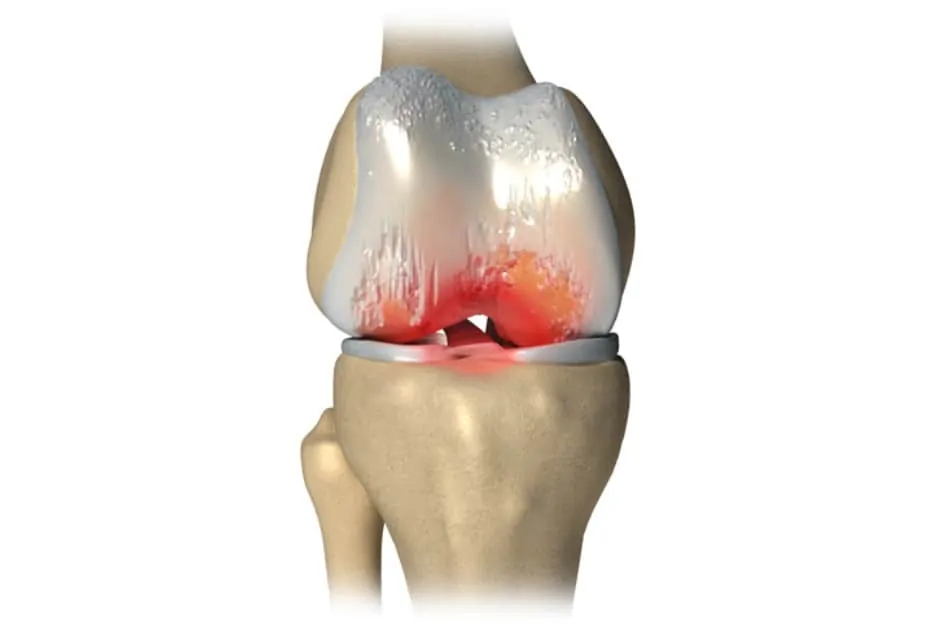If you’ve been around the blog before, you may have noticed that I frequently refer to myself as being obese and I often discuss obesity in general.
It’s a common term, which means people often understand the gist of what it means without knowing the exact definition. But what exactly does it mean to be obese?
Are you obese? Well, if you’re in the U.S. there is nearly a 50/50 chance that you are. As of 2020, 42% of adults in the United States were classified as obese.
Being obese is generally viewed as simply a weight issue so the logical question is, how much do you have to weigh to be considered obese? Is 200lbs considered obese? How about 300lbs?
We’ll take a look at the actual medical definition of obesity first and from there, we can figure out where the dividing line is.
What is Obesity?
Medically speaking, a person is considered obese if they have a Body Mass Index (BMI) of 30 or higher.
BMI is the ratio of a person’s height and weight. Think of it as how much you weigh per inch. Fatter people will naturally be larger around and will weigh more for every inch or foot of height.
In America, the formula is weight in pounds divided by height in inches squared with the resulting fraction multiplied by 703.
The metric formula is a bit simpler: your weight in kilograms divided by your height in meters squared.
I prefer an easier method to calculate BMI, however, which is simply to look at the chart below. It definitely saves a lot of time, particularly when I’m tired and don’t want to do any math.

A Few Notes on BMI
According to the scale, a BMI under 20 is considered underweight, 20-25 is the “normal” range, 25-30 is overweight (another term I don’t like), 30-35 is obese and 35+ is morbidly obese.
I’m not a huge fan of the BMI system because it’s a bit broad and doesn’t take a person’s exact situation into account because it doesn’t account for muscle mass.
Take a look at John Cena, star of the HBO Max series Peacemaker, various TV commercials, and 16-time WWE World Heavyweight Championship wrestler.
When he was in WWE, he was officially billed at 6’1″ and 251 pounds. I know wrestling heights and weights are often exaggerated a little to seem more impressive, but usually, they add an inch or two of height and take a few pounds off the weight.
Based on the formula above, John Cena would have a BMI of 33, putting him halfway between “obese” and “morbidly obese,” despite the fact that he has more visible abs than the number of meals I consume every day!
Is 200 Pounds Considered Obese? What about 300?
Now that we know what obesity is and how it relates to BMI, we can take a look at the central question: is 200 pounds considered obese?
The answer is that it depends on your height. A person who is 5’8″ is considered obese at a weight of 197 pounds or higher. Someone who is 5’9″, on the other hand, wouldn’t be obese until they reached 202 pounds.
For 300 pounds, the answer is almost always “yes”. Someone who weighs exactly 300 pounds would have to be 7’1″ in order to have a BMI below 30 and therefore not be considered obese.
Alternatives to BMI
Obesity is medically defined by using BMI and so that’s the measure we have to go with, all of my objections to the overly simplistic methodology aside.
If it were up to me (it isn’t, sadly), body fat percentage would be used to determine obesity, since it ignores muscle mass and focuses exclusively on how much fat a person’s body has.
Unfortunately, it’s really hard to calculate. The simple version involves measuring around your stomach, arms, and neck, then doing some calculations, but this also doesn’t take muscle into account.
The easiest way to calculate it involves being fully submerged in water, from which they can figure out body fat percentage based on water displacement. There are also methods that involve infrared lasers and other cool scientific things.
That being said, I don’t know my current body fat percentage and, to be honest, it doesn’t really matter to me. I’m more than just a set of numbers.
More on Obesity
In addition to having a BMI over 30, many people and places add another element to the definition, presumably to eliminate bodybuilders, professional athletes, and others with high muscle mass.
Under this definition, in addition to having a large amount of fat, the person must also suffer from negative effects due to the extra weight.
It is possible to be healthy despite having a high BMI. I haven’t seen my uncle in a few years because he lives a few thousand miles away, but the last time I did, he was about 5’10” and weighed 275 pounds.
My family and I went down to visit him about a week or so after he took a physical and a complete blood workup.
My parents, both of whom had a BMI of around 22 at the time, were shocked and a little dismayed when it turned out he had lower cholesterol and blood pressure than they did.
All of the tests turned out to be within the normal range, despite the fact we walked into my grandmother’s house to see him standing by his George Foreman grill, sipping a small cup of bacon grease like it was a tequila shot. That’s a true story!
That’s why, any time you look up anything obesity on a government or health organization’s website, you’ll see phrases like “obesity MAY put you at risk.” It’s possible to have a few extra pounds and be in good health.
Is Obesity Bad? Do I Need to Lose Weight Immediately If My BMI is Over 30?
Obesity itself isn’t inherently bad. If it’s causing health problems or your doctor insists you need to lose weight, it’s probably a good idea.
Granted, I’m not a doctor, but I’m the last person who will ever tell you that you need to lose weight if you don’t want to. If you’re comfortable with your weight, that’s awesome! If you want to lose some weight, that’s awesome!
The one thing that I will definitely say is that a hyper fixation on weight loss isn’t healthy. Emotional stress is probably going to be worse in the long run than physical stress on your body.
In my opinion, being comfortable in your own skin is a lot healthier and more important than losing weight to impress other people or because you think society demands it.
Summary and Final Thoughts
In conclusion, 200 pounds is only considered obese if you’re 5’8″ or shorter and 300 pounds is almost always obese unless you’re 7 feet tall.
That being said, I don’t live my life based on numbers from a scale or a BMI calculator. I’m happy with my current weight and according to my most recent medical examinations, I’m in pretty good physical condition, too.
Sure, I can’t run a mile in eight minutes and I get tired a little more easily than some of my friends, but I also don’t really have any interest in becoming an Olympic sprinter.
Being “obese” or not shouldn’t define your opinion of yourself, despite what advertisement agencies and Hollywood films suggest sometimes.
Most of us know our bodies pretty well and I know that I can always lose weight if I want to, but I also know that I enjoy eating Big Macs and I’m comfortable with how I look and feel.
If you’re happy with your weight, that’s all that matters. I also know that’s easier said than done.







